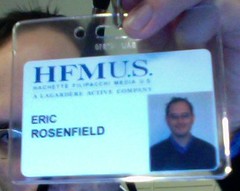Quick Notes
89-year-old Frederik Pohl has a blog. Who says you can't teach old SF grandmasters new tricks. (Though I can't agree with the sentiment that if you haven't heard of him you should be thrown into a wood chipper.
Also on the SF note, the Spanish Digg clone Menéame listed their 70 best Science Fiction novels of all time (in Spanish). What's interesting to me about this list is that there isn't a single book there that was originally written in Spanish, and the vast majority of them were written in English (though Stanislaw Lem and Jules Verne both make good showings). I honestly expected that, with all the Spanish speakers out there, that they would have SOMETHING of their own SF scene. Note further that this list was a REACTION to the list made by the Times of London of the 10 best SF writers, which the posters on Menéame thought was lacking. Does this mean SF is almost entirely the province of English-speaking countries (especially America and the UK)? I'm under the impression that both Russia and China have burgeoning SF&F scenes, so are they just not making as big an impression on the world stage? Is there something I'm missing?
Lastly (almost forgot), a Wet Asphalt essay is now part of a college curriculum. Is this a sign of the end times?
Your President is Now

An Intelligent Human Being.
Be happy.
Speculative Fiction in Conversation Part 2
This is part 2 of an email conversation I had with Matt Cheney about the state of Speculative Fiction. Read Part 1 Here.
Review: T-Mobile G1
I'm really enjoying telling you all about my new gadgets.
My old, crappy cell phone has been needing replacement for some time now, and given how enamored I am of my iPod Touch, an iPhone seemed like the logical choice. However, I balked at the 2-year service contract with AT&T. I've been without a yearly service contract for most of the time I've had cell phones— that is, since I got hit with an early termination fee in 2003 when I was going to Europe for a few months and decided it didn't make sense to keep my phone. It's a philosophy that's served me well; for example, when I moved to Vermont a couple years ago, I discovered T-Mobile didn't have any service in the state, so I simply canceled and got a month-to-month contract with Verizon. Then, when I moved back, I canceled the less-favorable Verizon plan and got T-mobile again.
So when I discovered that T-Mobile's Google Android powered G1 phone was available with my current, month-to-month plan, and I only had to add $25 a month for unlimited Internet, I was pretty well sold. Incidentally, my plan—called "FlexPay"— is only $40 a month for 1000 daytime minutes and unlimited nights and weekends, so with the $25 a month Internet it comes out to only $75 dollars a month total. This is significantly less than similar plans for the iPhone with its two year contract. (Though they don't seem to be offering my plan anymore, instead offering $40 for 600 daytime minutes and unlimited nights and weekends, which is still pretty good.)
State of the City
Today I live tweeted the New York State of the City address from Mayor Mike Bloomberg. Here's the key quote from the complete speech:
"We’ll also target the three precincts with the highest murder rates by seeking a public-private partnership that can fund cameras on street corners and problem places. Cameras, as you know, are proven to deter crime and help catch criminals. And for those who say this is a civil liberties issue, you’re absolutely right: it’s about the liberty of innocent civilians to live in peace. And we won’t rest until that’s true for every single New Yorker.
I really don't like this guy, and never did.
Also, not one word about the one issue I'm most concerned about, the MTA, and the stories that have been circulated about higher fares and reduced service lines like the G train, which I take every day to and from work.
Quick Notes
You may have noticed that I haven't been doing a lot of link round-ups lately. Part of that is because generally there are other people who do that better, and part of it is because I've moved my these-are-the-links-interesting-to-me posting to my twitter page, which I think is a more convenient and more effective way to do that sort of thing (at least, for me). (There's also still my del.icio.us page which has everything I'm looking at that I want to save for later.)
That said, here's a really great personal retrospective on Patrick McGoohan from The Beat.
In the French Overlord Watch department (I currently work for Hachette Filipacchi which is owned by the same company as book publisher Hachette Livre), Hachette is dropping most of its US ebooks over a geographical rights squabble. This seems to have something to do with American ebooks being available for sale in other countries, violating policies set between Hachette and other publishers, and Hachette and its own international divisions. (In other words, if you're in England you're supposed to by the English edition of a particular book, not the American one, even though you can download both from anywhere over the Internet.) Which sucks for those of us who might want to read ebooks published by Hachette, but more importantly may signal the coming rise of truly international publishing, where a single edition will be available to anyone in the world. Old Publishing will naturally fight against this, since it goes against business practices that are probably centuries old, but with the Internet and the rise of ebooks, this will probably be the future (at least, for ebooks).
Finally, there's been some discussion on the Intertubes about part 1 of my conversation with Matt Chaney, including posts at Chrononaut's Log and Torque Control. I'll probably have more to say about these posts and their comments later, but you guys should believe me when I say the conversation has just gotten started. Part 2 will be posted on Monday, and there should be two or three more parts to follow after that, totaling over 15,000 words of conversation.
Also, yes, I've finished Spaceman Blues and yes, I promised I'd write more about it, but I may not have time to give it the treatment it deserves until next month. But for now let's just say it's really awesome and you should go out and buy it and read it right now.
And, yes, JF Quackenbush promised to start his Dune take-down a long time ago and still hasn't, but he assures me that he'll start it up as soon as he finishes his law school applications.
Finally, incredibly useful tool Google Notebook is shuttering its doors, which kind of pisses me off since I use it to keep track of writing ideas and my Google Notebook is packed to the brim. I suppose I should transition to Evernote, but I'm started to wonder why I ever stopped using text files. (Okay, having your notes available from any computer and easily searchable, tagable and index-able is actually really useful. Damn you Google!)
RIP Patrick McGoohan
Patrick McGoohan, star, co-creator and co-writer of the seminal TV show The Prisoner, has died. The Prisoner may have been the strangest, most surreal, most unique show in the history of television.
You can watch every episode of it online at the AMC website.
Via Ed Champion and The Beat.
Speculative Fiction in Conversation Part 1
In November, I posted a blog entry about James Gunn's essay on protocols and ways of reading in science fiction, a concept he drew from the essay collection Starboard Wine by Samual R. Delany. While I was critical of Gunn's post, the concepts discussed made me realize that there might be a lot of SF criticism out there that I had never read and never even heard of. After a little Google searching, I discovered that the Delany book was out of print and difficult to find, however an earlier collection, The Jewel-Hinged Jaw, had a forthcoming reissue with an introduction by my own friend Matt Cheney, who was trying to get the other book back into print as well. Matt is also the author of the blog Mumpsimus, a number of fine short stories, is the series editor of The Best American Fantasy, and is an English teacher who's known to sneak speculative fiction into the curriculum. It seemed natural that I would turn to him to fill in the gaps in my own SF education. What follows is part 1 of the email conversation that resulted, which moves from criticism to the history of SF and the ongoing debate about SF's place in the literary world, and whether protocols really exist at all.
Spaceman Blues
I'll probably have more to say about this once I've finished it, but I just want to say that I'm reading Spaceman Blues by Brian Francis Slattery right now, and it's really, really good. May be the best book I've read since Cloud Atlas, and if you know how I feel about that book then you know it's high praise indeed.
I For One Welcome My New French Overlords

Today I started my new full-time job (my first as-such in years) at Hachette Filipacchi Media, publishers of many fine magazines and a division of Lagadère -- an enormous, multinational company based in France which also owns Hachette Livre which in turn owns Little, Brown (among other imprints), publishers of David Foster Wallace and Iain Banks and many other fine writers. So, good company anyway. (Ha, I made a pun. I am the funny.)
At first I was nervous during HR orientation when they told me that they didn't give root access to all computers to their users (so didn't let you install your own software) and didn't allow you to use your own computer (I'd brought my laptop in case they didn't have a computer set up for me yet). I was also nervous they would saddle me with a Windows box and make me use it. But then my superior showed me my desk, which had a PC AND an iMac, both of which I had root access to, and the PC was preloaded with VMWare with which I was able to easily install Linux. The PC has two monitors, so now I have Ubuntu Linux running on one monitor, Windows on the other, and then the iMac which setup looks something like this:

